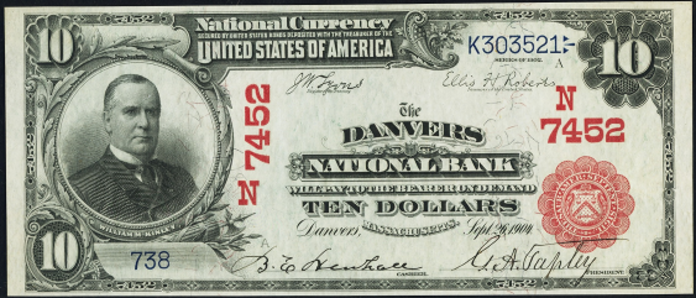Ten Dollar Notes › Nationals › 1902 Ten Dollar National Bank Notes › Pennsylvania Charters › 1902 $10 Pittston Pennsylvania First National Bank
Get Value Now
| Item | Info |
|---|---|
| Series | 1902 |
| Charter | #478 First National Bank of Pittston, Pennsylvania |
| Year Chartered | 1864, 503 Banks Chartered |
| City Info | Pittston is a city in Luzerne County, Pennsylvania, United States. It is situated between Scranton and Wilkes-Barre. The city gained prominence in the late 19th and early 20th centuries as an active anthracite coal mining city, drawing a large portion of its labor force from European immigrants. The population was 7,739 as of the 2010 census. At its peak in 1920, the population of Pittston was 18,497. The city consists of three sections: The Downtown, the Oregon Section, and the Junction. Pittston City is at the heart of the Greater Pittston region. Greater Pittston has a total population of 48,020. Source: Wikipedia |
| Similar Cities | If your note doesn't match try: 1. Pittston, Pennsylvania - Pittston National Bank 2. Pittston, Pennsylvania - Liberty National Bank |
| Seal Varieties | Red, Blue |
| See Also | If your note doesn't match try: 1. 1907 $10 Gold Certificate 2. 1901 $10 Legal Tender 3. 1908 $10 Silver Certificates |
| Other Info | 1. Value depends on notes known for charter, condition and market demand. |
| Neat Fact | Some issues contain regional geographic identifiers. N = New England. E = Eastern. M = Midwest. S = Southern. W = Western. P = Pacific. The letters were included for hand sorting purposes (Kelley, 5th Ed. P 5). |
No Obligations Offers and Appraisals
Please submit a good photo or scan. It will be identified and evaluated. Understand there may be subtle differences between the image you see above and your note. Signatures, design, markings and note condition will determine the offer price. Notes in Uncirculated or better condition receive the best offers.
Appraisals can be estimated for wholesale and retail prices. Wholesale is what dealers typically pay. Retail is what a collector might pay. Retail is slightly higher in most cases.
Please visit this page for USA Paper Money Reference. Do not treat this page as a reference guide, it is for appraisal and acquisition purposes only.
